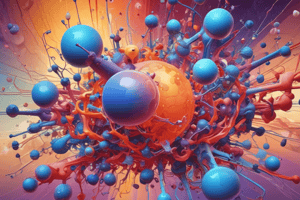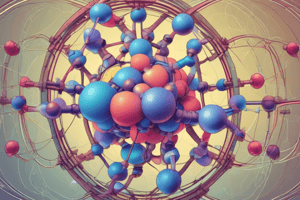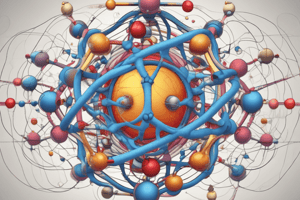Podcast
Questions and Answers
What is a characteristic feature of solids?
What is a characteristic feature of solids?
- They have a definite shape and volume. (correct)
- They can flow easily.
- They are composed of loosely packed particles.
- They have no definite shape.
Which type of solid has particles arranged in a regular, repeating pattern?
Which type of solid has particles arranged in a regular, repeating pattern?
- Crystalline solid (correct)
- Amorphous solid
- Liquid
- Gas
What occurs to the shape of a liquid when placed in a container?
What occurs to the shape of a liquid when placed in a container?
- It takes the shape of the container. (correct)
- It solidifies.
- It retains a fixed shape.
- It evaporates immediately.
Which of the following is an example of an amorphous solid?
Which of the following is an example of an amorphous solid?
What property defines viscosity in liquids?
What property defines viscosity in liquids?
Which of the following elements is a liquid at room temperature?
Which of the following elements is a liquid at room temperature?
Which state of matter has no definite shape and fills the space available?
Which state of matter has no definite shape and fills the space available?
What distinguishes a crystalline solid from an amorphous solid?
What distinguishes a crystalline solid from an amorphous solid?
What is the chemical formula for ozone?
What is the chemical formula for ozone?
How do the particles of a gas typically compare to those of a solid in terms of energy and movement?
How do the particles of a gas typically compare to those of a solid in terms of energy and movement?
What is the primary characteristic of plasma compared to solids and gases?
What is the primary characteristic of plasma compared to solids and gases?
Which of the following statements about particle interaction is true?
Which of the following statements about particle interaction is true?
What is a key role of the ozone layer in the atmosphere?
What is a key role of the ozone layer in the atmosphere?
Flashcards are hidden until you start studying
Study Notes
States of Matter
- Solids have a definite shape and volume.
- Particles are tightly packed and vibrate in fixed positions.
- Crystalline solids have particles arranged in a regular, repeating pattern.
- Examples include iron, copper, gold, and lead.
- Amorphous solids have particles without a regular pattern.
- Examples include glass, plastic, and rubber.
- Liquids lack a definite shape, taking the shape of their container.
- Liquids have a definite volume.
- Viscosity is a liquid's resistance to flow. Honey has high viscosity, while water has low viscosity.
- Examples include water, alcohol, gasoline, vinegar, milk, and orange juice.
- Gases have no definite shape or volume.
- Gases fill the available space.
- Examples include hydrogen, helium, oxygen, nitrogen, and ozone.
- Ozone is a gas made of three oxygen atoms (O₃).
- Other examples include carbon dioxide and carbon monoxide.
- Plasma is different from solids, liquids, and gases due to extremely high temperatures.
- Electrons leave their orbits, creating charged particles.
- Plasma is a very hot gas, often a product of nuclear fusion.
- Found in stars and considered a furnace for element creation.
Comparing States of Matter
- Temperature is a measure of particle movement.
- Gases have the highest energy and fastest moving particles.
- Solids have the lowest energy and slowest moving particles.
- Particle Interactions
- Solids have strong interactions between particles due to close proximity.
- Gases have weak interactions due to greater distances between particles.
Studying That Suits You
Use AI to generate personalized quizzes and flashcards to suit your learning preferences.




